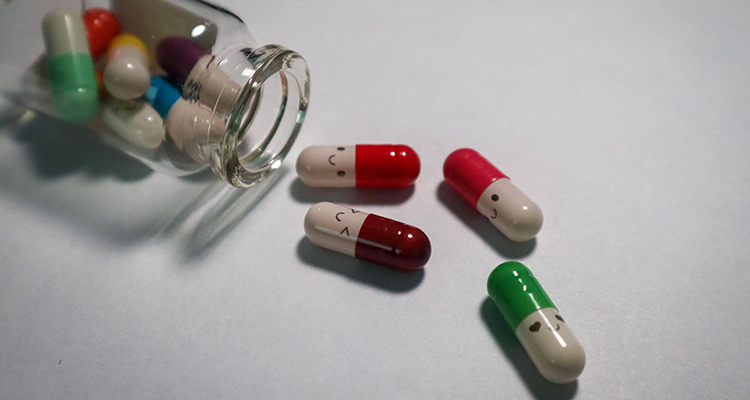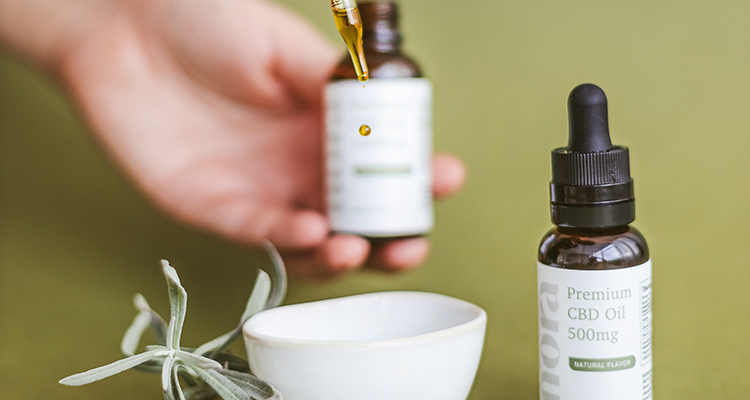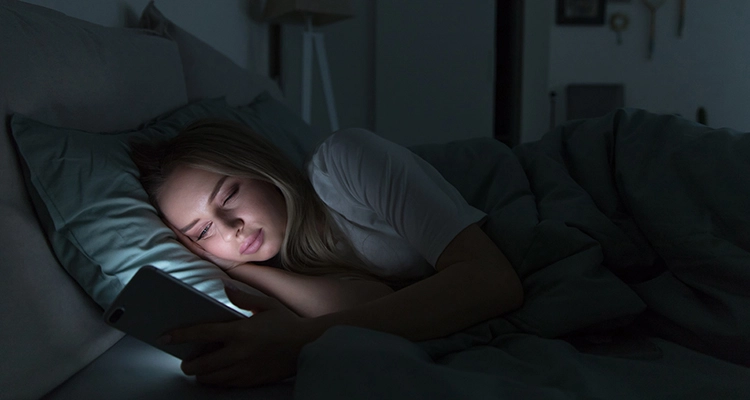Can I Take Benadryl to Treat My Insomnia?
If you’ve ever taken Benadryl to ease allergy symptoms or treat an allergic reaction, you know that it can cause extreme drowsiness. While this is an unpleasant side effect for most people, those suffering from insomnia may consider sleepiness a welcome relief. But can you use Benadryl as a treatment for insomnia and is it safe?

Here we’ll discuss the active ingredients in Benadryl, how it works, and if it’s a viable short- or long-term solution for sleep disorders including insomnia.
Content
Benadryl and Its Uses
Benadryl, also known as diphenhydramine, is a type of antihistamine designed to treat allergies, hay fever, and the common cold. Symptoms include itching, watery eyes, rash, cough, runny nose, sneezing, and itchy eyes, nose, and throat. Benadryl can also help prevent and treat stomach discomfort including vomiting, nausea, and dizziness caused by motion sickness.

One of the most common side effects associated with this over-the-counter drug is drowsiness. Benadryl blocks your body from histamine, a natural substance your body produces in response to an allergic reaction. Histamine also plays a part in how awake and alert you feel. When the medication blocks histamine to treat an allergic reaction or cold, it’s also reducing your wakefulness, causing drowsiness.
Risks of Taking Benadryl When You’re Not Sick
It’s never a good idea to ingest medication for any reason other than what it’s prescribed for. The same holds true for Benadryl. Unfortunately, with over 70 million Americans suffering from some form of insomnia, it’s tempting to use this antihistamine for its drowsy side effects.

The main reason being that in addition to drowsiness, Benadryl comes with a host of other dangerous side effects including dry mouth, urination retention, and even an altered mental state. Benadryl is a type of hypnotic agent that can also cause sleepwalking, memory loss, and parasomnias.
Parasomnias are disruptive sleep disorders that include abnormal movements, emotions, actions, and talking while sleeping. Some people experience nightmares, sleep terrors, sleep paralysis, and sleep-related eating disorders.
While antihistamines like Benadryl may help you fall asleep, the sleep quality is generally poor. Even worse, some people experience the opposite effects, causing hyperactivity and increased alertness. Using Benadryl to treat insomnia may work briefly but most people build a tolerance almost immediately, rendering the effects useless.
Many people taking Benadryl as a sleep aid wake the next morning feeling groggy or “hungover”. Even if you do fall asleep faster than normal, you’ll likely wake feeling even worse in the morning. Once you stop taking Benadryl, you may find it even harder to fall asleep than you did before. Benadryl offers a false sense of security for treating insomnia.
Healthier Alternatives for Treating Insomnia
Before you reach for Benadryl or another antihistamine, you should try other, healthier alternatives for treating insomnia.

These include but aren’t limited to the following.
Melatonin, Chamomile, and CBD
All of these sleep aids offer natural relief for insomnia sufferers. Unlike Benadryl which has a long list of adverse side effects, each of these natural supplements can ease insomnia symptoms with no adverse reactions.
Melatonin is a natural hormone released by your body to help prepare for sleep. It’s also credited for helping stabilize your body’s circadian-rhythm or sleep-wake cycle. If you’re suffering from insomnia and having trouble falling asleep, a melatonin supplement may help.
Chamomile is popular in tea and can help induce sleep. Chamomile contains an antioxidant known as apigenin which binds to receptors in the brain that initiate sleep and help reduce anxiety.
While research is still being done on CBD and its benefits, countless people use this non psychoactive product to help fall asleep faster and experience a more restful night’s sleep. Available in a variety of forms including oils, edibles, and capsules, be sure to check your local laws regarding the sale and purchase of products containing CBD.
Prescription Medications
If your doctor determines that you have chronic insomnia and your lack of sleep is significantly impacting your life, they may recommend prescription medication.

Ambien® (Zolpidem): Ambien® is one of the most popular sleeping pills on the market despite its long list of side effects. Like most sleep aids, this medication is only recommended for short-term use and isn’t a long-term cure for insomnia.
Lunesta® (Eszopiclone): Similar to zolpidem, eszopiclone is a prescription sleep aid that is approved by the FDA for long-term use. Patients suffering from chronic insomnia can take this sleep aid for up to six months at a time.
Doxepin: Doxepin was originally used as an antidepressant but was shown to help treat insomnia in low doses. Because Doxepin is non-habit forming, it’s often regarded as a safe alternative to Benadryl and other sleep aids.
Not only can Doxepin make it easier to fall asleep but also increase sleep quality and duration.
Ramelteon: Ramelteon interacts with your body’s melatonin receptors to help treat onset-insomnia without habit-forming tendencies
Adopt a Healthy Sleep Routine
In addition to the medications mentioned above, you can also make some lifestyle changes to support a better night’s sleep.
Set a sleep schedule by going to bed and waking at the same time each day, even on the weekends. Perform a calming ritual before bed that alerts your brain and body that it’s time for sleep. Popular choices include meditating, journaling, and reading.
Your bedroom should also be reserved for only sleep and sex. That means no working in bed or using digital devices like your phone or tablet. The blue light emanated by these screens can prevent your brain from producing melatonin, making it harder to fall asleep.
Understanding the Cause of Your Insomnia
Understanding the cause of your insomnia can help you choose the right treatment method. If you believe your inability to sleep is a short-term, isolated incident, you may take over-the-counter medications to help induce sleep. While Benadryl can make you drowsy, it’s not designed as a sleep aid but instead used to treat allergies, hay fever, and common colds. Avoid taking nighttime cold and flu medications that will leave you feeling groggy and hungover the next day.

If you’re suffering from insomnia due to stress, recent life changes, or a traumatic event, stress-reducing exercises and practices can help ease symptoms. Therapy (including CBT for insomnia), meditation, mindfulness, and yoga are all great ways to help reduce stress and address the core issue causing your sleep disturbance. Mental health disorders like depression can also cause insomnia.
Certain medical conditions and medications can also cause both chronic and acute insomnia. Check the side effects of the medications you’re on and see if trouble sleeping is common. Health issues including chronic pain, Alzheimer’s disease, cancer, diabetes, heart disease, and asthma can all trigger insomnia symptoms. Knowing the trigger is the first step in finding a treatment plan that works.
Benadryl Isn’t a Practical Treatment for Insomnia
Are you suffering from chronic insomnia? If so, you may be desperate to find a cure. Unfortunately, there’s no known cure for insomnia but instead a variety of treatment options that, used in conjunction, can help ease symptoms.

After weeks or months of sleep deprivation, you may consider using Benadryl and other antihistamines for relief. These medications are notorious for causing drowsiness but their effects are not long lasting. They can also cause adverse side effects that may be worse than the insomnia itself.
Instead, opt for stress-reducing exercises, natural supplements, and a variety of therapies. At Somnus Therapy, we use a mult-faceted approach to help ease insomnia symptoms so you can achieve the blissful nights sleep you deserve. Click here and start your journey now!













